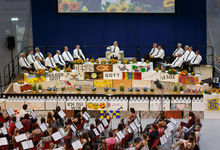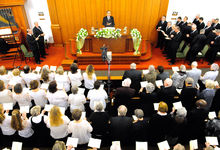The new creation makes no distinctions
Is eternal glory a divided society? In an essay, the Chief Apostle revises certain conceptions from the past, and justifies this with a simple and clear biblical thought.

Even if the official textbook Questions and Answers does not explicitly say so: for the longest time, it was almost considered a dogma in the New Apostolic Church that only those who have been sealed will receive the fullness of eternal salvation. “The place which the Lord has prepared is not intended for everybody,” it said in a 1995 circular which the Chief Apostle had addressed to all Apostles then. And in a much-read exegesis on the Revelation of John, a District Apostle, in 1968, made the difference between the members of the household of God and other subjects who experience God’s nearness only occasionally.
Not criticism, but gospel
Chief Apostle Schneider addresses such thoughts in an essay titled “Salvation in the new creation”. The text is based on a spiritual presentation given at a District Apostles’ conference, and was then first of all published in a special edition of the Divine Service Guide (02/2015) for the ministers. The statements will now appear in community and other publications of the New Apostolic Church.
“The objective of these remarks is not to criticise the doctrinal statements of any of our spiritual fathers or the convictions of any of our members. Rather, it is necessary to draw attention to the gospel of the love and grace of God and call upon all of us to take direction from it.”
The answer from the Bible
The Revelation of John speaks of New Jerusalem and of servants who will serve God and reign with Him. Does that mean that the bridal congregation will occupy a special position in the new creation?
“Such an idea is not consistent with the humble attitude God requires of the Christian,” is one part of the answer. “How can we claim to have earned more than all others in the kingdom of God, knowing that no one can ever enter there without having received the grace of God?”
Above all, “Such notions do not correspond with the testimony of the New Testament,” the Chief Apostle says and points to 1 Corinthians 15: 28 where it says that God will be all in all. “If God is going to be all in all, then there cannot be anything that goes above and beyond that. There is nothing that could be greater than the fullness of eternal life or eternal fellowship with the triune God in His glory and light!”
A question of election and motivation
The Chief Apostle also identifies possible reactions to the idea of absolute equality in the kingdom of God of all those who have decided for Christ. He says, for example, “If others are going to receive the same as we are, why should I do more than everyone else?”
His answer: “The bride distinguishes herself by her deep love for the bridegroom. Within her burns the desire to be in fellowship with the One whom she loves. The prospect of being with the Lord in heaven—without having to wait for the Last Judgement—alone suffices to motivate her.”
Above all, however: “Love for the Lord is inseparably linked to the love for our neighbour.” And that means: “If we truly love others the way Jesus loves us, we will not be indignant if He allows our neighbour to have the same reward He grants us …”
“Others fear that we might call our election into question.” His response to this: “We have not been elected so that we can be the only ones saved, but rather to have the opportunity to be the first to be delivered! Let us not forget that our election is first and foremost a calling: we have been called to serve the Lord, to proclaim the praises of God, both today and in the thousand-year kingdom of peace.”
True love does not aim for privileges
That is why Chief Apostle Schneider calls on us to make enough room for the worship and adoration of God, and to cultivate our love for God and our neighbour. Because “those who are aware of the majesty of God will know how to appreciate the grace that God grants them in order to gain access to His glory.” And then he says, “True love does not aim to acquire any greater reward or any greater privileges.”
“Motivation derives from our trust in God and our love for Him, as well as the longing to live in eternal fellowship with Him,” it says in conclusion. “If this lives within us, we will also have the longing to have as many people as possible live in such a fellowship with us!”
Photo: psdesign1 - fotolia.de







